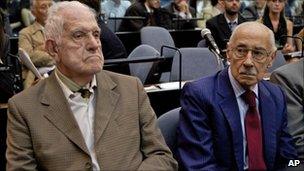Argentina's ex-military leaders tried over baby thefts
- Published

The trial is expected to last several months
Two former military leaders have gone on trial in Argentina, accused of overseeing the systematic theft of babies from political prisoners.
Jorge Videla and Reynaldo Bignone are accused of kidnapping some 30 children whose parents died or disappeared during the 1976-83 military rule.
Six others, including ex-officers and a doctor, are also on trial.
More than 100 children are known to have been given for adoption to military or police couples.
The long-awaited trial, which is being televised, is the first time Argentina's military leaders have faced charges of operating a systematic plan to steal babies from pregnant prisoners.
The parents were then killed or "disappeared".
The defendants are charged with "taking, retaining and hiding minors and changing their identities".
The trial is focusing on the fate of at least 34 children who were born to mothers being held in the two main prisons used during military rule, the Naval Mechanics School, or Esma, and the Campo de Mayo military base.
Recovered identities
The case came to trial mainly because of the efforts of the human rights group, the Grandmothers of the Plaza de Mayo, who have campaigned to find out what happened not only to their children but also their grandchildren.
It is expected the trial, being held in a Buenos Aires court, will take several months at least, with about 370 witnesses expected to testify.
Videla, 85, has already been sentenced to life after being found guilty of crimes against humanity, while Bignone, 83, was given 25 years in jail last April after being convinced of human rights abuses.
The others accused of involvement in the systematic theft of babies are: Santiago Omar Riveros, Ruben Oscar Franco, Antonio Vanek, Jorge Luis Magnacco, Juan Antonio Azic and Jorge Acosta.
Human rights groups say 30,000 people died or disappeared during what became known as the Dirty War.
They say at least 400 children were "stolen".
The Grandmothers have identified dozens of children of people who disappeared during this time.
But some adopted children have said they would rather not know their origins, especially if the information implicates their adoptive parents in illegal acts.
- Published22 December 2010
- Published7 June 2010